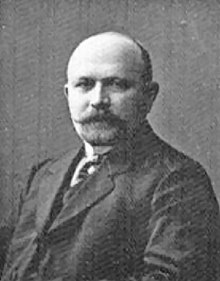Friedrich Wachhorst de Wente
Friedrich Wachhorst de Wente (born February 23, 1863 in Bottorf , Bersenbrück district ; † February 16, 1939 in Groß Mimmelage , Bersenbrück district) was a German farm owner, agricultural functionary and politician. The Evangelical Lutheran Wachhorst de Wente was MdR and MdL (Prussia).
Life
After primary school and attending a private school, the farmer's son attended grammar school and secondary school in Osnabrück and Quakenbrück . The agricultural training on his father's farm was followed by activities on various farms in the Hildesheim area . After taking over his father's business, Wachhorst de Wente made a name for himself above all by taking on honorary agricultural posts in the region and by founding agricultural organizations.
Friedrich Wachhorst de Wente joined the National Liberal Party. For them he belonged to the Reichstag from 1907 to 1912 , where he had been elected in the home constituency of Melle-Diepholz (Hanover 2). In 1912, however, he lost the constituency to a Guelph , who was supported by the center . As an important agricultural politician, he was a member of the executive committee of his party for the Osnabrück administrative region and has represented the region at national liberal party conferences since 1896. From 1912 to 1918 the farmer was even a member of the central executive committee of the National Liberal Party.
In 1914, meanwhile widely known as an agrarian interest representative, he reached the Reichstag again in a by-election in the constituency of Magdeburg 2, where he was able to wrest the constituency from the German conservatives. When the National Liberal Party dissolved after the collapse of the German Empire , Wachhorst de Wente joined the left-liberal German Democratic Party (DDP), whose appeal he co-signed. In the domestic constituency 15 (Weser-Ems) he reached the Weimar National Assembly in 1919 . However, due to the great loss of votes by the DDP, he did not get into the Reichstag in 1920.
However, Wachhorst de Wente was also a member of the Prussian House of Representatives from 1913 to 1918 for the National Liberal Party . As an increasingly important agricultural functionary for the party, the farmer belonged to the Prussian state parliament from 1920 to 1932 for the DDP and from 1930 for the German State Party (DStP), as the party has called itself since then. With the complete demise of the party in 1932, his political career ended. 1918/19 Wachhorst de Wente was a member of the provisional main board of the DDP, 1920 to 1930 of the Reich board. He was also a leading member of the DDP's Reich Committee on Agriculture.
In 1909, Wachhorst de Wente was together with his national liberal party friend Hermann Wamhoff , who also came from the Osnabrück region, founder of the small and medium-sized German farmers' union , which he headed for the time of its existence as chairman. The German Farmers' Union was politically close to the National Liberal Party, fought against the large-scale agricultural conservative Union of Farmers (BdL) and had around 9,000 members in 1909, around 50,000 in 1914 and around 20,000 in 1924. The focal points of the farmers' organization were the Osnabrück region , the province of Posen , Hesse , the state of Oldenburg and the Altmark . The organization was important in attracting agricultural voters to the National Liberals and the DDP, the greatest success in this regard being achieved in the 1919 elections. The German Farmers' Union became a member of the German peasantry in 1927 , with Friedrich Wachhorst de Wente becoming chairman of the executive committee. He rejected the conversion of the German peasantry into the German Peasant Party , as it was pursued by two important member organizations, the Bavarian Farmers 'Union and the Silesian Farmers' Association. Therefore, the support of this small farmers 'party, which won eight seats in the Reichstag in 1928, was limited to these two farmers' associations.
literature
- Bernd Haunfelder : The Liberal Members of the German Reichstag 1871-1918. A biographical manual. Aschendorff, Münster 2004, ISBN 3-402-06614-9 , pp. 411-412.
- Helmut Lensing: The German farmers' union in the county of Bentheim . In: Bentheimer Jahrbuch 1995 (= Das Bentheimer Land . Volume 133 ). Bad Bentheim 1994, p. 241-261 .
- Gerhard Müller, Herbert Schwab: German Farmers' Union (DB) 1909–1927 . In: Dieter Fricke u. a. (Ed.): Lexicon on the history of parties. The bourgeois and petty bourgeois parties and associations in Germany 1789–1945 . tape 2 . Leipzig / Cologne 1984, p. 33-41 .
- Karin Jaspers / Wilfried Reinighaus: Westphalian-Lippian candidates in the January elections 1919. A biographical documentation , Münster: Aschendorff 2020 (Publications of the Historical Commission for Westphalia - New Series; 52), ISBN 9783402151365 , pp. 195f.
Web links
- Friedrich Wachhorst de Wente in the database of members of the Reichstag
Individual evidence
- ↑ Bernhard Mann (edit.): Biographical manual for the Prussian House of Representatives. 1867-1918 . Collaboration with Martin Doerry , Cornelia Rauh and Thomas Kühne . Droste Verlag, Düsseldorf 1988, p. 398 (handbooks on the history of parliamentarism and political parties, volume 3)
| personal data | |
|---|---|
| SURNAME | Wachhorst de Wente, Friedrich |
| BRIEF DESCRIPTION | German politician, farm owner, agricultural functionary and politician (DDP, NLP), MdR |
| DATE OF BIRTH | February 23, 1863 |
| PLACE OF BIRTH | Bottorf , Bersenbrück district |
| DATE OF DEATH | February 16, 1939 |
| Place of death | Groß Mimmelage , Bersenbrück district |
